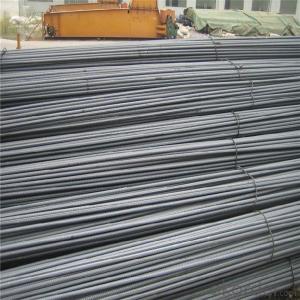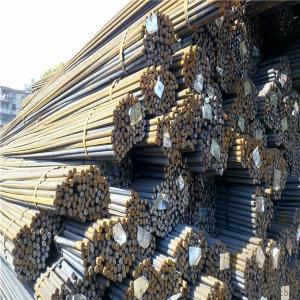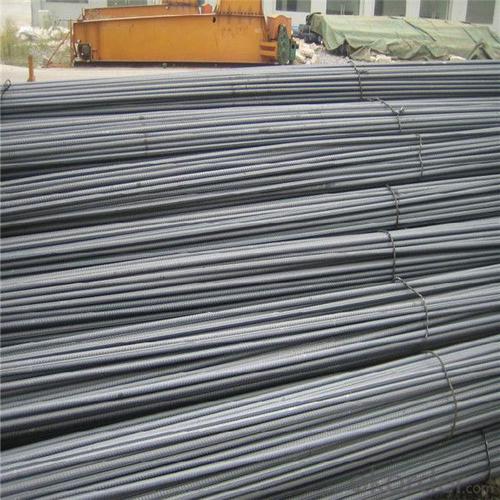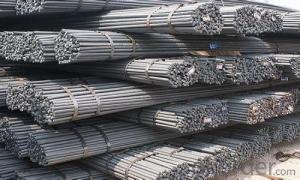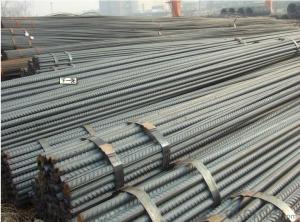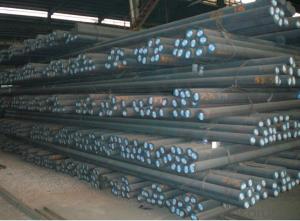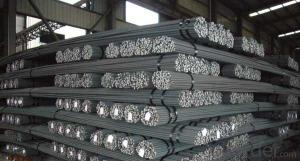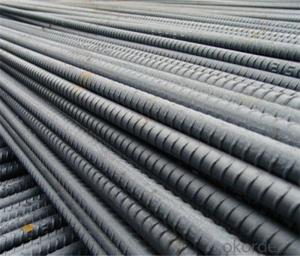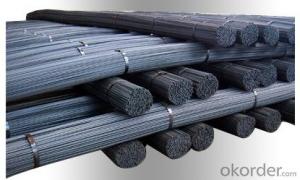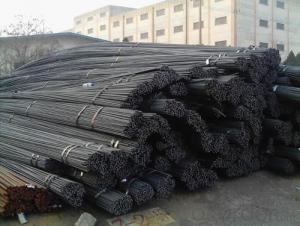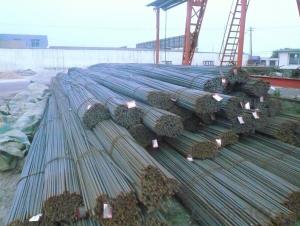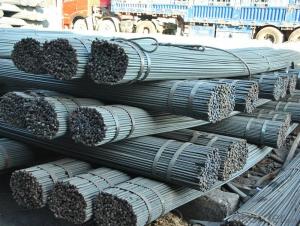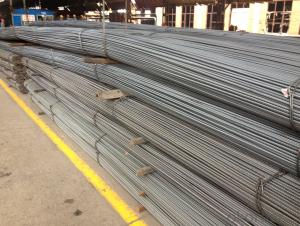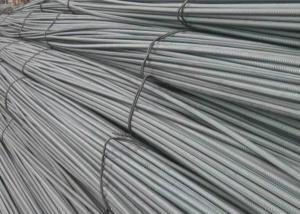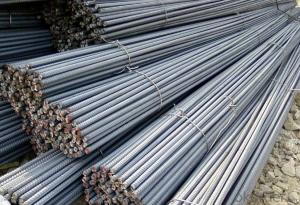Dia 5-50mm Deformed Steel Rebar for construction
- Loading Port:
- Tianjin
- Payment Terms:
- TT OR LC
- Min Order Qty:
- 100 m.t.
- Supply Capability:
- 19000 m.t./month
OKorder Service Pledge
OKorder Financial Service
You Might Also Like
Specification
Steel rebar is metal bars often used in construction for pouring concrete or supporting walls and columns. The rebar can
be smooth, though they are frequently manufactured with deformations that create greater texture to which concrete can
adhere, creating a stronger bond that helps prevent cracking of concrete. These deformations do not create weaknesses in
the rebar, and when rebar is measured to determine its diameter, it is typically measured at the narrowest point. Strength
grades indicate the amount of pressure the steel rebar can withstand, and grade and diameter are typically presented in both
imperial and metric units.
Most grades of steel used in rebar cannot accept welding; such as, to adjacent steel plates or as means to bind single
pieces of rebar together. However, special grades of rebar steel and welding rods make welding by expert welders possible.
Features
1、Pure steel quality, stable chemical contents, small tolerance.
2、Constant Quality, good drawing performance.
3、High dimension accuracy degree, accuracy degree of Level C up to 80%, smooth surface, less scale, easy to be pickled.
4、Automatic bundling with 4 lines by Machine in tidy and good looks
5、Big high quality percentage, small coil percentage, and heavy coil weight for Hard Coil.
6、High sorbitizing percentage.
Product Description :
Chemical composition (%): | Steel | C | Si | Mn | P | S | Ceq | ||||
HRB335 |
0.25 |
0.80 |
1.60 |
0.045 |
0.045 | 0.52 | |||||
HRB400 | 0.54 | ||||||||||
HRB500 | 0.55 | ||||||||||
Mechanical properties | Steel | Rel/ MPa | Rm/ MPa | A/ % | Agt/ % | ||||||
≥ | |||||||||||
HRB335 | 335 | 455 | 17 |
7.5 | |||||||
HRB400 | 400 | 540 | 16 | ||||||||
HRB500 | 500 | 630 | 15 | ||||||||
Package: | Standard export packing or as customer's request | ||||||||||
Application: | Construction, building, bridge, road. ect | ||||||||||
Payment terms | 1).100% irrevocable L/C at sight. | ||||||||||
Delivery time | 15-30 days after receipt of L/C or deposit by T/T | ||||||||||
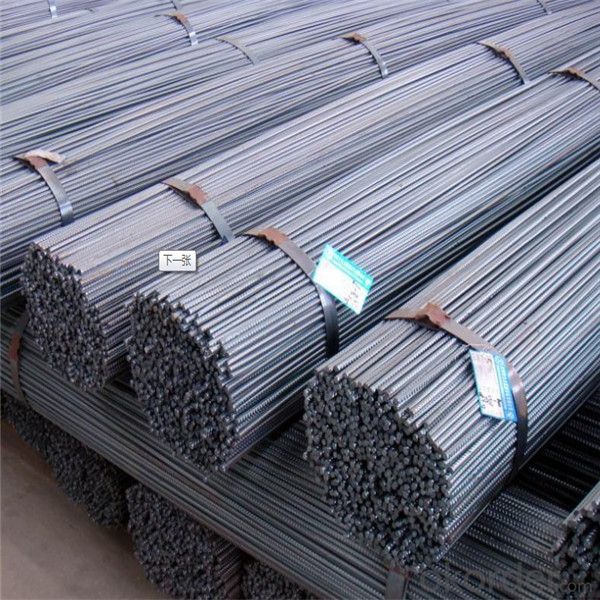
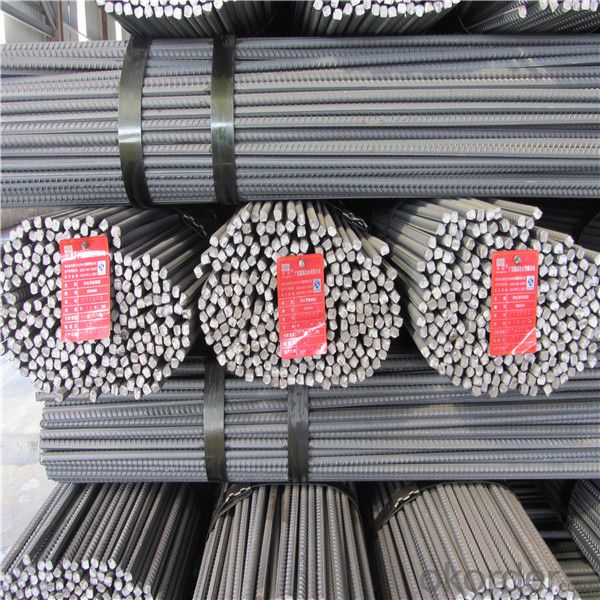
Packing:
In bundles, each bundle weight 3.5 tons. Load by container or by bulk verssel.
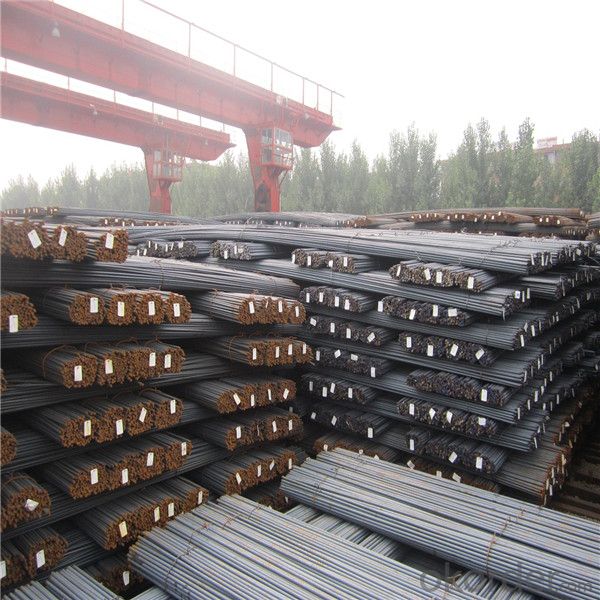
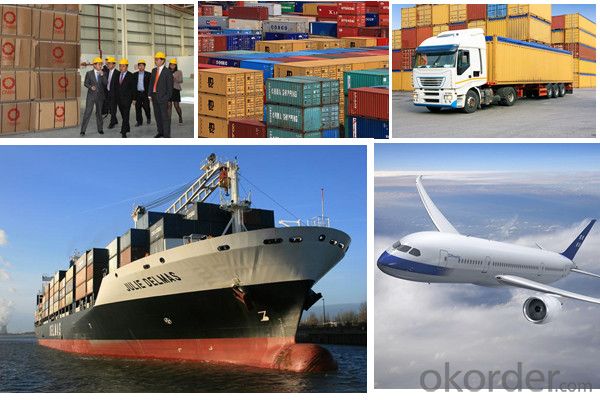
Our service
(1) We cooperate with famous factories with advanced equipment and well trained workers.
(2) We can provide factory price with trading company service.
(3) We continuously work on the improvement of our processes, guaranteeing consistently high standards
of quality to keep none compensation.
(4) We guarantee 24 hours response and 48 hours solution providing service.
(5) We accept small order quantity before formal cooperation.
(6) We deliver the agreed quality at the agreed time, reacting to changes in customer wishes in a flexible way.
(7) Due to our volume and selling power, we have excellent freight rates with shipping lines.
(8) We strive to always be fair and honest in our dealings with customers.
(9) We strive to work together with customers to achieve much more than we can achieve alone.
(10) Through our passion and commitment we aim to be a market leader in all our key markets. To maintain
our position as market leader we must continue to add value in all that we do.
FAQ:
1.Q: What's your MOQ(minimum order quantity)?
A: One full container, mixed acceptable .
2. Q: What's your packing methods?
A: Packed in bundle or bulk ..
3. Q: How can I buy CNBM products in my country?
A:Please send us an inquiry or email ,we will reply to you if there is distributor in your country
4. Q: Can we visit your factory?
A: Warmly welcome. Once we have your schedule, we will arrange the professional sales team to follow up your case.
5. Q: How long does it take to get the product if i place an order?
A:With the process of your requirements,we will pack and deliver in 3-7 days. If it is by sea shipment,it will take 15-45 days depending on different locations
- Q: Can steel rebars be used in modular bridge construction?
- Modular bridge construction utilizes steel rebars, also known as reinforcing bars, to enhance the structural integrity of precast concrete elements. This construction method offers efficiency and cost-effectiveness. Precast elements are fabricated in a controlled environment, ensuring consistent production and high-quality outcomes. The steel rebars are accurately incorporated into the elements during manufacturing, eliminating the need for on-site rebar installation. Steel rebars play a crucial role in withstanding the loads and stresses experienced by bridges. They distribute the load evenly, preventing concrete elements from cracking or failing. By incorporating steel rebars into modular bridge construction, the durability and longevity of the bridge structure are ensured. The integration of steel rebars in the modular bridge design allows for flexibility and customization. Different sizes and configurations of rebars can be used to meet the specific requirements of each bridge project, optimizing its structural performance. In summary, steel rebars are extensively utilized in modular bridge construction due to their ability to reinforce, strengthen, and enhance the durability of precast concrete elements. This approach offers a cost-effective and efficient construction process while maintaining the structural integrity of the bridge.
- Q: Can steel rebars be used in structures with high seismic activity?
- Yes, steel rebars can be used in structures with high seismic activity. Steel rebars have high tensile strength and provide reinforcement to concrete structures, making them more resistant to seismic forces. They help to improve the overall structural integrity and ensure that the building can withstand the shaking and ground movements caused by earthquakes.
- Q: What is the process of handling and transporting steel rebars on-site?
- The process of handling and transporting steel rebars on-site typically involves several steps. First, the rebars are delivered to the construction site either by truck or by train. Once at the site, the rebars are unloaded and organized in a designated area. To ensure easy access and prevent damage, rebars are often stacked in bundles or placed on steel racks. Next, rebars might need to be cut or bent to fit the required specifications for the construction project. This can be done using specialized equipment such as hydraulic shears or rebar benders. The rebars are then sorted based on size, length, and shape to facilitate their installation. During the construction process, rebars are lifted and moved using cranes, forklifts, or other lifting equipment. Safety measures, such as wearing personal protective equipment (PPE) and following proper lifting techniques, are essential to prevent accidents and injuries. Once the rebars are in their designated locations, they are tied together using wire or rebar tie guns to create the desired reinforcement structure. This ensures the rebars remain in place during concrete pouring and maintain the structural integrity of the construction project. Overall, the process of handling and transporting steel rebars on-site involves delivery, unloading, organization, cutting/bending, sorting, lifting, tying, and placing the rebars according to the project requirements and safety guidelines.
- Q: What are the guidelines for proper curing of concrete structures with steel rebars?
- To ensure the strength, durability, and longevity of concrete structures with steel rebars, it is crucial to properly cure them. Here are some guidelines to consider: 1. Moisture Control: Maintaining a moist environment around the concrete structure is vital during the curing process. This can be done by either covering the concrete surface with a plastic sheet or using a curing compound. These measures prevent water evaporation, which can lead to shrinkage, cracking, and reduced strength. 2. Curing Duration: The duration of curing depends on factors like the concrete mix, environmental conditions, and the complexity of the structure. Generally, curing should last at least 7 days to allow sufficient strength development. However, for structures with steel rebars, it is advisable to extend the curing period to 14-28 days to ensure proper hydration and bonding between the concrete and steel. 3. Temperature Control: Temperature plays a crucial role in the curing process. Avoiding extreme temperature fluctuations is important as they can negatively affect concrete strength and durability. High temperatures can cause rapid drying and shrinkage, leading to cracks. Freezing temperatures can impede hydration. Therefore, maintaining a moderate and consistent temperature is essential for effective curing. 4. Protection from External Factors: During the curing period, concrete structures should be shielded from external factors that can compromise their integrity. This involves avoiding direct sunlight, rain, strong winds, or any adverse weather conditions. Additionally, protecting the concrete from potential damage caused by construction activities or heavy loads is vital. 5. Regular Inspection and Maintenance: Regularly inspecting the concrete structure throughout the curing process is necessary to identify issues like cracks, honeycombing, or inadequate curing. Any problems should be addressed promptly to prevent further damage. Once the curing process is complete, implementing a proper maintenance plan is crucial to ensure long-term durability and structural integrity. By adhering to these guidelines, the proper curing of concrete structures with steel rebars can be achieved, resulting in strong, durable, and dependable construction.
- Q: Can steel rebars be used in structures with high resistance to moisture?
- Steel rebars can be used in structures with high resistance to moisture. However, it is important to note that steel is susceptible to corrosion when exposed to moisture for prolonged periods. To mitigate this risk, protective measures such as proper concrete cover and waterproofing techniques must be employed. Additionally, using steel rebars with corrosion-resistant coatings or alloys, such as epoxy-coated or stainless steel rebars, can further enhance the resistance to moisture. Proper design, construction, and maintenance practices are crucial to ensure the longevity and durability of structures in high-moisture environments.
- Q: What is the role of steel rebars in minimizing the risk of concrete spalling due to sulfate attack?
- Steel rebars play a crucial role in minimizing the risk of concrete spalling due to sulfate attack by providing reinforcement and increasing the overall strength of the concrete structure. When concrete is exposed to sulfate ions, it can undergo a chemical reaction that leads to expansion and cracking, resulting in spalling. However, steel rebars act as a reinforcement, helping to distribute the stress and load throughout the concrete, reducing the risk of cracking and spalling. Additionally, the presence of rebars helps to maintain the structural integrity of the concrete, preventing the ingress of sulfate ions and minimizing the potential for sulfate attack.
- Q: Can steel rebars be used in industrial flooring?
- Industrial flooring can indeed incorporate steel rebars, as they possess remarkable tensile strength and durability. The incorporation of steel rebars in concrete construction, particularly in industrial flooring, is a widespread practice. These rebars are strategically positioned within the concrete to reinforce it and provide additional strength, enabling it to withstand heavy loads and prevent cracking. By utilizing steel rebars in industrial flooring, the capacity to bear weight is significantly augmented, and the floor's longevity and structural integrity are assured. Furthermore, steel rebars can be effortlessly welded or linked together to form a grid or mesh, further enhancing the floor's strength and stability. Hence, steel rebars are a suitable choice for industrial flooring applications.
- Q: How do steel rebars contribute to the crack control in concrete structures?
- Steel rebars contribute to crack control in concrete structures by providing reinforcement and strength. When concrete dries and hardens, it tends to shrink, which can lead to the formation of cracks. However, the presence of steel rebars helps to distribute the internal stresses caused by shrinkage and other factors, thereby reducing the likelihood and extent of cracking. The rebars act as a reinforcement in the concrete, helping to hold it together and preventing cracks from spreading or forming in the first place. Additionally, rebars can also provide resistance against external forces, such as seismic activity or loads, further enhancing the crack control in concrete structures.
- Q: What is the purpose of stirrups in steel rebar reinforcement?
- Stirrups in steel rebar reinforcement serve to offer lateral support and improve the overall structural integrity of reinforced concrete components. Typically made of bent steel bars, stirrups are positioned around the longitudinal rebar within concrete columns, beams, or slabs. One of the primary functions of stirrups is to prevent buckling or bending of the longitudinal rebar caused by external forces like compression, tension, or shear. By enclosing the rebar with closely spaced stirrups, the strength and stability of the reinforced concrete element are significantly increased. Additionally, stirrups play a crucial role in resisting shear forces, which arise when a structure is subjected to lateral loads or earthquakes. These forces can lead to cracking and failure of the concrete. However, stirrups distribute shear stresses more evenly, effectively impeding the formation and propagation of cracks. Moreover, stirrups enhance the bond between the rebar and concrete by providing extra contact area. This, in turn, results in improved load transfer and prevents slippage between the rebar and the surrounding concrete. To summarize, stirrups in steel rebar reinforcement aim to enhance the structural strength, stability, and durability of reinforced concrete elements. They offer lateral support, resist bending and shear forces, and enhance the bond between the rebar and concrete. By incorporating stirrups into the reinforcement design, engineers can ensure that the concrete structure can withstand various external loads and maintain its integrity over time.
- Q: Can steel rebars be used in pre-stressed concrete elements?
- Yes, steel rebars can be used in pre-stressed concrete elements. Rebars are often used to provide additional reinforcement and strength to pre-stressed concrete structures, helping to counteract the tensile forces that may be induced during the pre-stressing process.
Send your message to us
Dia 5-50mm Deformed Steel Rebar for construction
- Loading Port:
- Tianjin
- Payment Terms:
- TT OR LC
- Min Order Qty:
- 100 m.t.
- Supply Capability:
- 19000 m.t./month
OKorder Service Pledge
OKorder Financial Service
Similar products
Hot products
Hot Searches
Related keywords
